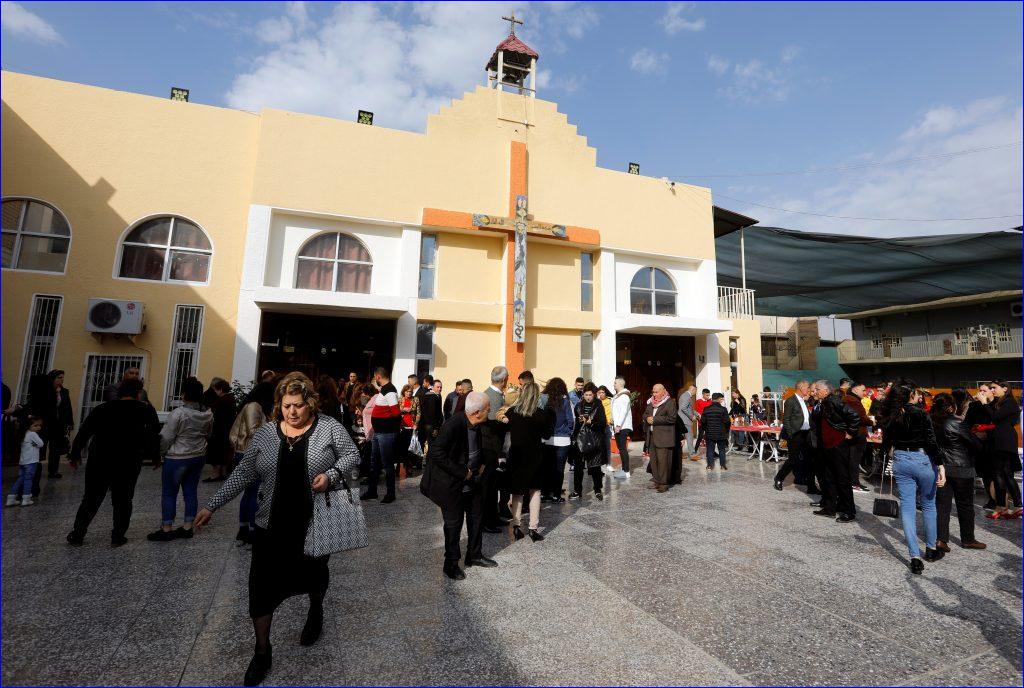


 CNS/Khalid al Mousily/Reuters)
CNS/Khalid al Mousily/Reuters)
When it comes to foreign policy, that means an American trying to take his or her Catholic identity seriously right now would at least be pondering the impact of U.S. actions, or inactions, on fellow Christians on the ground.
In the context of tensions between Iran and the U.S. following the killing of Iranian General Qassem Soleimani in Baghdad, Iraq, that implies American Catholics might want to be listening to what Catholic leaders in the neighborhood are saying.
Here's what we've heard from the leaders of the Chaldean Catholic Church in Iraq, one of the 23 Eastern churches in communion with Rome, and the largest Catholic community in the country most likely to be ripped apart by any new wave of regional conflict.
In the immediate aftermath of Soleimani's death, Cardinal Louis Raphaël I Sako of Baghdad, Iraq, primate of the Chaldean Church, released a statement: "Iraqis are still in shock of what happened" and "have fears of having Iraq turned into a battleground."
Related: Timeline of ISIS in Iraq
Related: Attacks on Assyrians in Syria By ISIS and Other Muslim Groups
Later, in his homily for the feast of the Epiphany on Jan. 6, Cardinal Sako warned that Iraq and the entire Middle East has become "a volcano on the verge of eruption."
A "shocking" escalation of confrontation between the parties, decisions dictated "by emotion and impulse," he said, are signs of a "lack of wisdom and understanding of responsibility."
Cardinal Sako appeared to be speaking on behalf of all Iraqis, Christians, and Muslims alike, inviting followers of both traditions to "consider the consequences of their strategies thoroughly."
Related: Brief History of Assyrians
Related: Assyrians: Frequently Asked Questions
His comments came before President Donald Trump said that Iran appears to be "de-escalating" and that the U.S. is ready to negotiate, perhaps signaling a step back by both sides, but the cardinal's alarm remains relevant depending on what happens next.
Cardinal Sako's fellow Chaldean prelate, Archbishop Bashar Warda of Erbil, echoed the patriarch's sentiments while also focusing specifically on the situation facing the Christian minority of Iraq and the Middle East.
"Peace and harmony" in Iraq, he said in a Jan. 8 statement, are key for "the survival of Christianity in the country."
"The current tensions are threatening the serious fragility of the communities, which are tired of war and the tragic consequences of it," Archbishop Warda said.
"They have continually suffered far too much and can no longer face an unknown future," he said. "They need the certainty, reassurance, hope, and the belief that Iraq can be a peaceful country to live in rather than being victims and endless collateral damage."
Archbishop Warda, by the way, is a key player in one of the most inspiring, and under-reported, Christian dramas of our time, which is the gritty effort to rebuild the Christian footprint in the Nineveh Plains region of northern Iraq, the cradle of Christianity in the country and one of the oldest Christian communities anywhere in the world.
When ISIS occupied the Nineveh Plains in 2014, they launched a spasm of killing and destruction aimed at Christians, which has been recognized formally by the U.N., the U.S. government, Pope Francis, and other international figures and institutions as a genocide.
Since the defeat of ISIS forces in May 2017 by coalition forces, those Christians have been rebuilding, determined not to see the light go out on the faith in one of the places of its birth. They've had precious little public support in doing so, either from the government of Iraq or international bodies such as the U.N.
Most big-dollar funds sponsored by the U.N. or major global NGOs (nongovernmental organizations) tend to administer aid through the region's major refugee camps, which Christians tend to avoid out of fear of jihadist infiltration and further exposure to danger. As a result, they're entirely reliant on the Church, and the local churches of Iraq clearly don't have the resources to foot the bill.
Since 2017, major Christian organizations -- frankly, the majority of them Catholic -- have stepped into that breach, including the papal foundation Aid to the Church in Need, the Knights of Columbus, and the Catholic Near East Welfare Association, buoyed by the donations of countless individual Catholics in America and elsewhere.
I've dubbed this Nineveh Plains reconstruction project a "Dunkirk in reverse," an informal rescue flotilla designed not to get people out, but to help them stay. Like the original Dunkirk, it's deeply inspiring, perhaps the gutsiest ongoing Christian story anywhere in the world.
"It has been a very challenging road to raise funds and international support to help us to physically regain what we lost starting in August 2014," Archbishop Warda said, in what can only be regarded as a significant understatement.
From the beginning, people involved in the effort have warned that a new eruption of violence could put the entire enterprise at risk. As one parish priest in a Christian village on the Nineveh Plains told Crux in 2018, "If war comes back again, all the Christians will leave, and we'll only know about a Christian presence here from history books."
Of course, the Middle East is a notoriously complicated place, and trying to figure out the right course is never simple. As American Catholics face that complexity, however, if they're not at least considering what figures such as Cardinal Sako and Archbishop Warda are saying, then something has gone seriously wrong.

or register to post a comment.